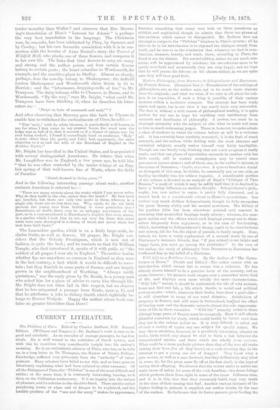Modern Philosophy, from Descartes to Sehopenhauer and Hartmann. By Francis
Bowen. (Sampson Low.)—Translations of the writings of philosophers are as the author says, apt to be much more obscure than the originals ; and what we want, if we care at all about the sub- ject, is an exposition, if such a thing is possible, of their various systems within a moderate compass. The attempt has been made again and again, but in our view it has rarely been very successful. The fact is, without a wide course of philosophical reading, it is quite useless for any one to hope for anything very satisfactory from manuals and handbooks of philosophy. A person, too, must be in thorough sympathy with the subject, or else what he reads will seem to him so much unmeaning jargon. There is, however, we quite admiti. a class of students to whom the volume before us will be a welcome aid. It has certainly been carefully executed ; it is the fruit of much research, and the author, while dealing with the most abstruse and technical subjects, usually makes himself very fairly intelligible. Though one can hardly help thinking that not much progress is really made, and that one phase of speculation succeeds to another with but little result, still in modern metaphysics may be traced some permanent corner-stones; and of these, one, in the author's opinion, is the axiom of Descartes,—Cogito, ergo sum. A system based on a denial or disregard of this may, he thinks, be summarily put on one side, as leading inevitably into the wildest vagaries. A considerable portion of the volume is devoted to an analysis of Kant's "Critique of Pure Reason," a work of which it may be safely said that it is destined to have a lasting influence on modern thought. Schopenhauer's philo- sophy, too, DOW rather in vogue, is pretty fully discussed, and is traced back to a considerable extent to Hume's speculations. Our author very much dislikes Schopenhauer, though he fully recognises his great literary ability and his mental acuteness. The fallacy of his position (this has been elsewhere pointed out) consists in assuming that unsatisfied longings imply misery ; whereas, the ener- getic action and the efforts which such longings prompt are in them- selves frequently keen enjoyment, as in the case of fox-bunting, which, according to Schopenhauer's theory, ought to be wretchedness and misery, till the fox, the object of pursuit, is finally caught. Here, indeed, we have a ready explanation of a remark made by one of Hartmann's intimate friends, that "if you wished to see bright and happy faces, you must go among the pessimists." In the case of our author, the study of philosophy from Descartes to Hartmann has confirmed him in the belief of a Christian.


































 Previous page
Previous page